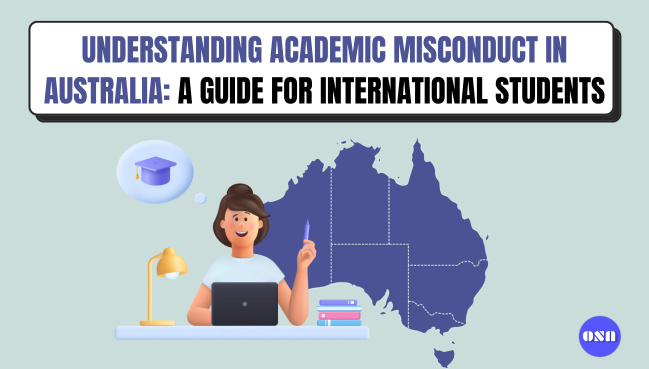Understanding Academic Misconduct in Australia: A Guide for International Students

As an international student, you might have come across a very important term in Australian academics, “Academic Misconduct”.
With more international students choosing to study in Australia than ever before, it is critical to explain the concept of academic integrity and academic misconduct to the student.
But due to language barriers and various other reasons, some students might not understand the importance of these terms.
So in this article, we are giving you detailed information to help you understand the academic misconduct in Australia and its impact on you as a student in Australia.
What is Academic Integrity?
Academic Integrity is about acting honestly, responsibly, ethically in your studies.
It is about maintaining those values when doing your assignments, research, homework, exams and all other academic
It is expected by all universities in Australia that students and staff must adhere to academic integrity standards.
What is Academic Misconduct?
Academic misconduct refers to any action or attempt made by a student or group of students to gain an unfair advantage over others in an academic setting.
Academic Misconduct is a serious offense and can have serious consequences if breached.
Types of Academic Misconduct
These are the common types of academic misconduct you must know about:
📝 Plagiarism: It is an act of copying others’ work without giving credit. This includes words, ideas and information from sources without credit. You are basically claiming it to be your work when it is not.
📚 Cheating: It is about unfair actions during exams, tests, quizzes, like looking at someone else’s paper or using notes when not allowed.
🧪 Fabrication: Making up data or sources or lying about information in assignments or research papers, similar to telling a made-up story.
🤝 Collusion: It is about working together on academic tasks with other students when you should do tasks alone.
💰 Contract Cheating: An act of paying someone else to do your homework, assignments, tests, etc. Contract Cheating is illegal in Australia.
🎭 Impersonation: Having someone else pretend to be you and getting them to sit test on your behalf.
🧾 Misrepresentation: Giving fake documents or information, like using a fake ID or fake academic transcripts.
🚫 Breach of Exam Rules: Breaking the rules set out by your educational institutions during the exam, like using phones when it’s forbidden.
Consequence of Academic Misconduct
These are some of the consequences of academic misconduct:
- Failing and repeating the subject: You might receive a failure for the subject and might have to repeat the subject again.
- Formal warnings: Your educational institution might issue you a formal warning letter.
- Additional costs: If you have to repeat the unit or subject, then you may also have to pay additional costs for that.
- Expulsion from the university: You might also be expelled from the university or college if you were involved in serious academic misconduct.
- Student Visa Jeopardy: Serious cases of academic misconduct can also lead to criminal charges, visa cancellation and deportation.
What happens if a student is accused of Academic Misconduct?
Here are the steps that are usually expected in cases of academic misconduct. Please note that these steps may vary from one institution to another.
But here are the general overview:
- Notification: Students get notified about the allegation of academic misconduct.
- Investigation: Education institute starts investigation about the allegations made.
- Meeting: Students are usually expected to attend the meeting with the academic faculty members and can provide their side of the story.
- Evidence review: After the meeting, students reponses and evidence is evaluated by the educational institution.
- Academic hearing: Student might be required to attend the academic hearing if the evidence suggests academic misconduct.
- Decision: After hearing, the decision is made about whether a sanction should be imposed or not.
- Appeal: If the student was given a sanction (discussed above in the consequences), then they can appeal if they believe that the decision for sanction was unfair.
- Documentation: Any outcome of academic misconduct is recorded in Student’s academic records.
How to avoid Academic Misconduct?
Here are ways on how you can avoid academic misconduct:
- Own work: Always do your own original work.
- References: Always reference your work with the correct reference style used by your educational institute.
- No Cheating: Never involve in any cheating whether if it is with friends or using paid services.
- Check your submission: Double-check your work before submission. You can use tools to check your plagiarism score for any unintentional plagiarism.
- Time Management: Managing your study, work and life balance will help you plan for your academic career. You can download free time management template from our website here.
- No Sharing: Sharing is not always caring. So, don’t share your work with others unless it’s allowed by your educators.
- Support Available: Use the academic resources and support channels provided by educational institutes
- Seek support: If in doubt or struggling with your academic works, then seek support from the right channels. The earlier, the better.
Reporting Academic Misconduct
If you come across any academic misconduct by any other student or peers, then you should promptly report it to your educational institution.
Most universities and educational institutions in Australia will have clear guidelines on how and where to report academic misconduct.
You can research that information on your education institute’s website.
How to get support?
If you are struggling to complete assignments, tasks, or homework, then help is available via your educational institutions.
The first point of contact for support is your teacher.
If they can’t help you with your questions, they will direct you to seek support from academic channels at your institution.
So, don’t hide away and seek support as soon as you need it.
If you want to know everything about assignments in Australia, then check our detailed guide on it.


